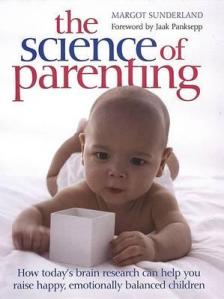the science of parenting is a misnomer
Posted by: sarah on: 19 July 2013
I can be stubborn about not listening to anybody. Even so, I’ve read three books about raising littles, and The Science of Parenting by Margot Sunderland is the second.
It’s okay.
It advocates a way of parenting that aligns with what I’m already doing, so reading mostly felt like a continuous pat on the back.
However. If I were parenting differently, I’d probably feel nothing of the kind. I’d probably feel like a recipient of Chinese water torture, an insidious drip drip drip of you’re doing it wrong.
And how exactly is that helpful?
Most parenting tomes are biased in one way or another, naturally. But I expected a book called The Science of Parenting to be, I don’t know, truer to the spirit of scientific inquiry and reportage.
The Science of Parenting is biased interpretation, not scientific synthesis. Really, its neurobiology never moves much beyond “stress chemicals are bad.”
I think we can all agree that persistent high levels of stress chemicals have harmful effects on the developing brain. That’s why we don’t abuse or neglect our children. But is it enough to tout the scientific superiority of attachment-style parenting?
I doubt it. Because the momentary, infrequent stress caused by controlled crying or spanking or time-out is a far cry from long-term neglect or abuse, and to lump them all together is expressly unfair. It’s hard to believe that a child who is receiving plenty of love and affirmation overall will suffer irreparable damage from, for instance, a few hours of sleep training. Besides, I’m sure separation anxiety is stressful, too, but I still need to shower sometimes.
(Not that I mean to defend corporal punishment or controlled crying. That’s a separate rabbit trail.)
There’s nothing really problematic with The Science of Parenting, except that it doesn’t actually uncover the science of parenting. These days motherhood feels more like art than science, anyway. Sunderland preaches nicely to the choir but I don’t see this book drawing new converts. For a more solid foray into the existing body of research, I’d recommend John Medina’s Brain Rules for Baby. The writing is better!
Leave a comment